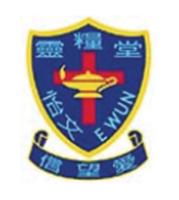| Language Policy |
1. English is the medium of instruction adopted by junior form Mathematics and Science. English is also used as the language across the curriculum of Life and Society, History, CIT, Geography and Business Fundamentals, particularly in extended learning activities of these junior form subjects; <br>2. English is the medium of instruction used in senior form Mathematics, Citizenship and Social Development, Physics, Chemistry, Biology and Economics. |
| Learning and Teaching Strategies |
1. Through implementing the homework policy, students are encouraged to form good learning habits;<br>2. Students are respected as individual learners and are trained to develop self-learning skills;<br>3. Students are taught with a variety of learning methods to increase their own knowledge;<br>4. Daily-life topics are used to stimulate students' learning interests and broaden their outlook and knowledge of the world;<br>5. Formative assessments are conducted to inform students about their learning progress, and appropriate feedback is given by teachers;<br>6. In accordance with the curriculum guidelines issued by the Curriculum Development Committee, school-based curriculums are prepared for teaching purposes. While teaching, subject teachers also consider students' learning ability and differences to adjust teaching progress;<br>7. Both the English and Chinese Departments implement small-class teaching at different levels to raise students' language proficiency and take care of learning differences;<br>8. Both Citizenship, Economics and Society and Life and Society are taught in junior forms in order to prepare students for studying Citizenship and Social Development in senior forms;<br>9. STEAM education is conducted to cultivate students' spirit of inquiry for scientific research and it also aims to fully unleash students' potential in innovation; and 10. Gifted education is implemented in order to teach students according to their aptitude and to cultivate students to have a long-term and broader vision. |
| School-based curriculum |
1. Electives: 2X and 3X. Time allocation is optimized to maximize subject choices for students. Please refer to our school website for timetabling details.<br><br> 2. Curriculum highlights: To cater for individual learning needs, our school-based curricula of Chinese, English and Mathematics are tailor-made for students with different abilities. In addition, English Language Arts is provided to junior classes so as to improve their English proficiency. |
| Approach to Catering for Learner Diversity |
More than 39% of teachers have received professional training in the areas of gifted education and special education so as to cater for students' diverse learning needs in an effective way. Our school aims at developing students’ potential, so that they can grow up in a caring and inclusive environment. In addition, we provide individual academic tutorial classes in English and Chinese. There are also after-school tutorial classes to help students to cope with the learning difficulties and increase their learning motivation. We also offer the "Little Buddies Scheme" which improves students' social skills and mental health. Last but not least, we value parent-school relationships. We will have regular parents’ meetings, workshops and phone calls in order to understand parents’ needs and students’ situations at home. |
| Approach to Integrated Education |
Our school is committed to building an inclusive and caring campus. It supports students with special educational needs in the whole-school approach. Our school hopes to provide them with appropriate and diversified support services to enhance their learning effectiveness. The Learning Support Committee includes a special education needs coordinator, a SEN support teacher, counsellors, teachers in the Department of Teaching and Learning, social workers and educational psychologists. Our psychologists provide teachers with training to support students, parents and teaching staff with special educational needs. Our school has a flexible use of the "Learning Support Allowance" to recruit additional staff, including student counsellors and supporting staff. |
| Education Support for Non-Chinese Speaking (NCS) Students |
|
| Home-School Co-operation |
1. The School highly values school-family rapport; <br>2. The School has founded the Parent-Teacher Association; <br>3. The School holds Parents' Nights and Parents' Days regularly;<br>4. The School issues school newsletters to students' parents regularly; and<br>5. The principal attends the meetings chaired by the PTA to consult parents' opinions. |
| School Ethos |
1. To implement Christian Education; <br>2. To emphasize self-discipline and Christian doctrines; <br>3. To implement dual class-teacher systems; and<br>4. To reinforce school-family rapport. |
| School Development Plan |
The School adopts a 3-year cycle for the development plan. The School Major Concerns for 2021-2024 include: <br>1. To reform school curriculum and promote effective learning; <br>2. To nurture positive values in students and promote a spirited outlook on life; <br>3. To encourage continuous teacher training and strengthen professional leadership.<br> |
| Teacher Professional Training and Development |
1. To encourage continuous teacher training for sustainable professional leadership at school.<br>2. To share the spirit of "servant leadership" culture in school management;<br>3. To establish an evaluation framework for subject administration. |
| Life-wide Learning |
Our school focuses on life education and creates an atmosphere through the implementation of different school-based activities, allowing students to recognize and establish the following core life values (including gratitude, resilience, appreciation, philanthropy, enthusiasm and service). Our school also places great emphasis on positive education and value education. Through different activities and learning experiences, students are able to establish positive attitudes towards life and values.<br><br>Extra-curricular activities are divided into five categories: academic, sports, art, interest and service. To adopt the Invitational Education and Success Education, the School provides students with more than 40 clubs to help develop their potential. In the past academic year, the performance of the Boys' Basketball Team, Voluntary Service Club and Girl's Volleyball Team were quite outstanding. This academic year, the focus is to implement the idea of developing one's potential in sport, arts and music so that students can have more opportunities to develop their talents. |
